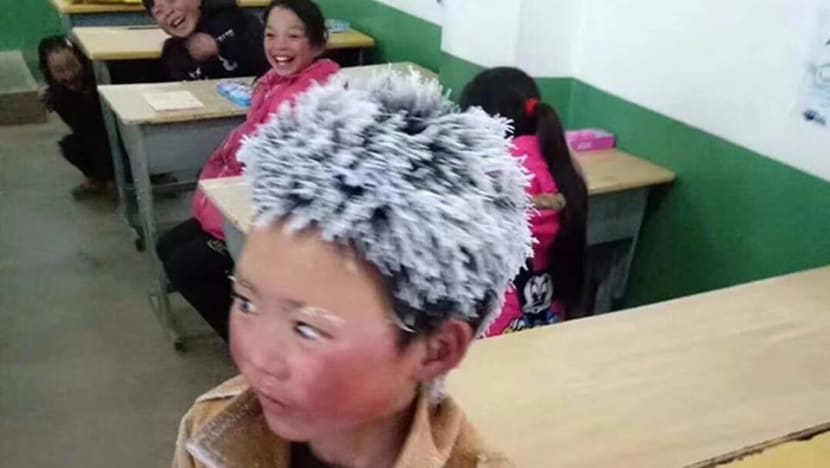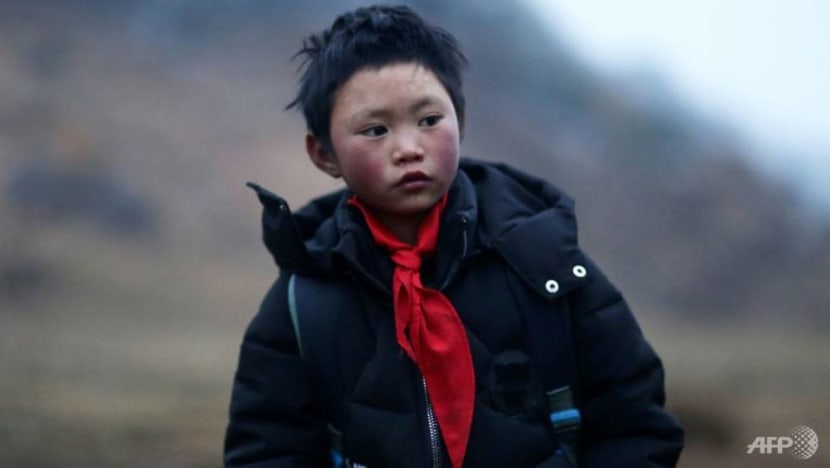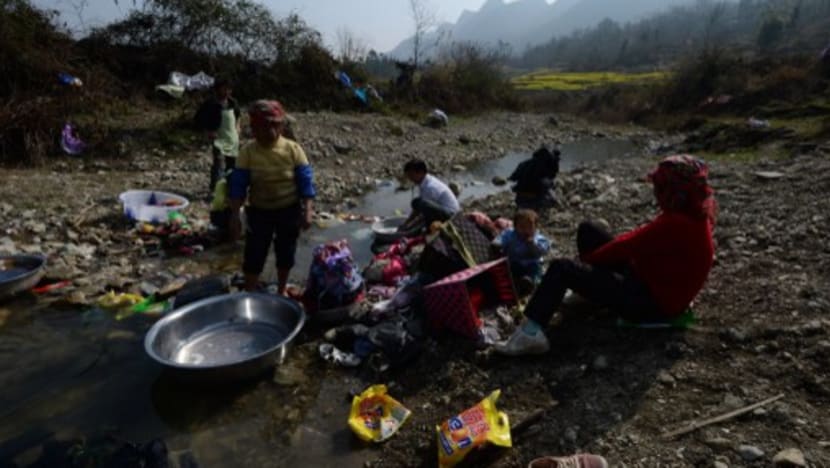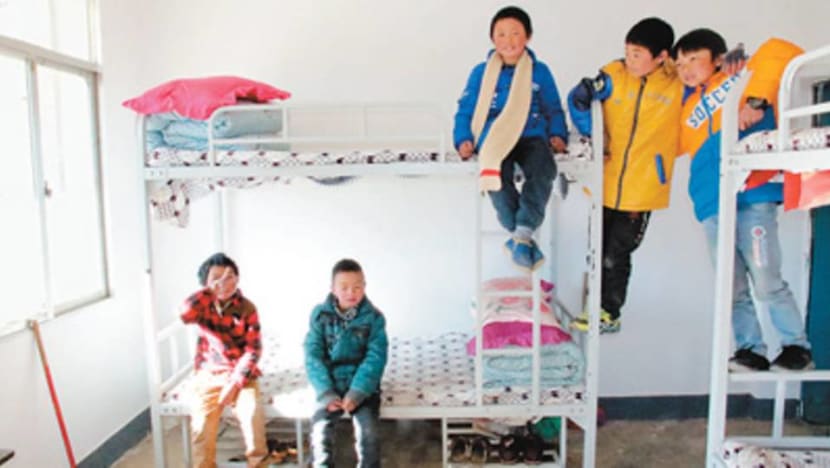commentary Commentary
Commentary: A year on, China’s 'Ice Boy' a media superstar, but a generation of left-behind children remain forgotten
It is heartwarming to see Wang Fuman living a better life today but the story for others who suffer from the same plight isn’t as warm and fuzzy, says Tom McGregor.

The 8-year-old made a funny face after arriving in class covered in frost, causing his classmates to burst into laughter, his principal said. (Photo: Weibo)
BEIJING: When a photo of an unknown Chinese child living in a remote rural village went viral on social media last year, his life was transformed overnight.
More than a year ago, 8-year-old Wang Fuman was just an ordinary, impoverished child living in Ludian county, in southwestern China’s Yunnan province.
Yet, his life had been permanently altered after his braving a freezing winter’s morning trek across the snowy 4.5km-walk to attend Zhuanshanbao Primary School, took the Internet by storm.

READ: Chinese 'ice boy' melts hearts after 4.5km walk to school in subzero weather: Reports
With frost coating his hair and eyebrows, his trudge through the icy landscape to reach school on the first day of his final exams warmed hearts all across the world, after his teacher posted a photograph of that sight to behold on her Weibo account.
INTERNET SENSATION
After the laughter stopped, the students returned to their studies, not realising the image of ice boy had spread like wildfire on China’s social media platforms and was generating massive media coverage worldwide.
As Wang Fuman ended the school day, little did he know when walking back to his mud hut home that he had become an Internet sensation. No doubt, the long journey was just an ordinary day for him and for tens of millions of other similarly impoverished children residing in China.
Maybe it was Wang’s winning smile, but his newfound stardom had sparked a fever pitch of people pouring in with donations to his family.
So much money streamed in that a new charity organisation was set up on his behalf - the government-run Yunnan Youth Development Foundation - to ensure the money was not funneled into illicit activities.
CHINA'S FORGOTTEN CHILDREN
Wang is not the only child in China who has endured much suffering, with no money for heating in the school he went to and having to work on the farm he and his grandmother lives on.
The nation has what’s known as 61 million left-behind children, who continue to live in rural villages, while both their parents migrate to bigger cities in search of better jobs. They are expected to fend for themselves, since the grandparents who now raise them are often too sick and frail to move around.

READ: 'Ice boy' stirs poverty debate in China as donations pour in for needy students
As a result, 70 per cent of these left-behind children suffer from emotional trauma, depression or anxiety, studies have shown.
In many Chinese rural communities, if a child is born disabled, many of them are abandoned by their biological parents, since they lack the resources to care for them. State-run orphanages are concentrated in urbanised cities, meaning that access to help may be limited.
Fortunately, a few charities have sprung up in patches across China’s vast countryside to take an active role to rescue them and provide housing, food, education, medical assistance and emotional support.
Orphanages, like the Liming Orphanage in Biancun, Central Hebei province, provide round-the-clock care for disabled children in small farming villages.
A string of shocking incidents and fatal accidents of left-behind children in rural areas in recent years have also sparked off greater awareness of this vulnerable group, as media coverage galvanised action from authorities to safeguard their welfare.
THE COST OF GROWTH
“Many babies first arrived on the verge of death, coming either as premature infants or diagnosed with fatally-ill medical conditions. Yet somehow, many miraculously survive and go on to lead more healthy and productive lives,” Lu Jiling, director of Beijing Baby Home, an orphanage that has rescued over 1,000 children on the outskirts of the capital, told China Daily.

READ: China orphan who broke our viewers’ hearts finds a home, 4,500km away in Singapore
“The nannies work in three 8 or 9-hour daily shifts with 14 to 16 nannies working per shift as each is responsible for two to three babies to feed, bathe, clothe, play and give them motherly love. They do everything except for hospitalised medical care,” Lu added.
The social cost of China’s rapid development has come under the spotlight over the past year, as the trend of parental migration to urbanised cities takes its toll. Even China’s hukou household registration system that governs rural residents moving to cities has come under review.
ALL CHILDREN DESERVE LOVE
It is heartwarming to learn that one year after Wang Fuman’s photo went viral on social media, he now enjoys a home on a paved road not far from his school, with his father working in a higher-paying job nearer to their home, allowing him to more fully support his family.
His school also now has better heating, new facilities including an art room, computers and electronic learning materials after contributions from the government and the Chinese public poured in – and he also stays at the school dormitory along with other classmates.
But meanwhile, let’s not forget about the other left-behind children of China, whose parents have to make the painful decision to leave them in the care of aged grandparents and head to the cities for work.
Let’s also remember all the other unsung heroes, including the many men and women who work night and day at orphanages and schools to care and rescue hundreds of thousands of other abandoned or left-behind children in the country.

With a generation of Chinese kids growing up in these conditions, perhaps the larger story here is that the ardent pursuit of growth can come at a pretty high cost. Not every child can find this same amount of support that Wang’s fame has allowed him to stumble upon.
Tom McGregor is a commentator on Asia-Pacific affairs based in Beijing.












